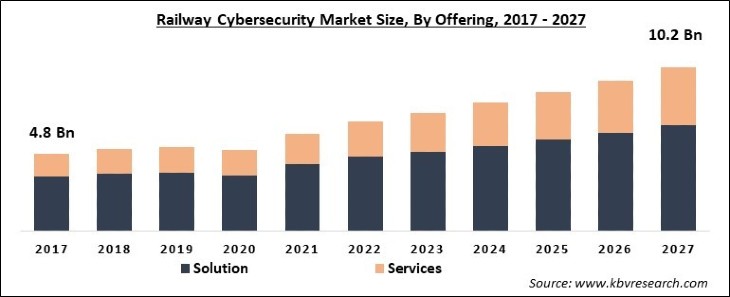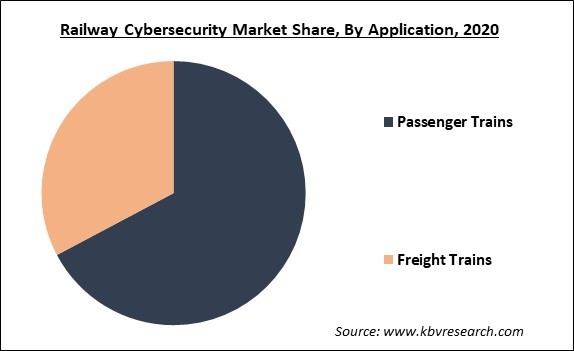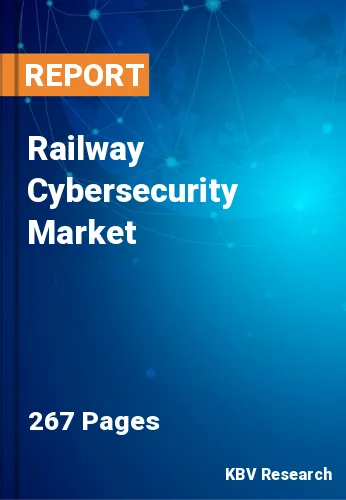The Global Railway Cybersecurity Market size is expected to reach $10.2 billion by 2027, rising at a market growth of 9% CAGR during the forecast period. Railway cybersecurity aims to safeguard the infrastructure, data, and digital resources from cyber-attacks, malware, ransomware, and others. In addition to it, railway cybersecurity aims to protect the infrastructure and enterprise data from harmful cyberattacks. Moreover, the authorities define the focus of the railway on the intensity of threat and their vulnerabilities. Railway cybersecurity provides services and solutions to recognize cyber-attacks and define countermeasures with the help of automated systems.
Some of the major catalysts for the growth of the railway cybersecurity market is a surge in the number of railways cyberattacks and a constantly growing demand for cybersecurity solutions. In addition, the global railway cybersecurity market would witness lucrative growth opportunities due to the growing deployment of automated technologies and IoT, government norms, and statutes regarding data protection like the General Data Protection Regulation (GDPR). Moreover, the growth of the market is further boosted by the growing installation of cybersecurity solutions, and a surge in the number of the cyber-attack vulnerability of rail traffic management like traffic control, routing, signaling, and among others.

With the global COVID-19 pandemic, the leading railway component makers/solution vendors introduced the postponement of production/services because of the reduced demand, supply chain disruptions, and to safeguard the security of their workers. The demand for commercial rail vehicles and mass transportation reduced in 2020 which further influenced the delay in the installation of railway cybersecurity initiatives. In addition, the development of the new rail projects is likely to be hampered by the low amount of budget allocations for R&D activities due to the outbreak of the global pandemic.
The demand for railway cybersecurity solutions is mainly affected by the allocation of government budgets, combined with the demand from rail operators. Moreover, the production and sales of rail vehicles in 2020 are expected to be decreased by the current COVID-19 pandemic. The decrease had a major impact on the railway cybersecurity market due to the reduced demand for freight trains in 2020.
Due to the outbreak of the global COVID-19 pandemic, rail traffic has been severely affected. As per the Deutsche Bahn, the utilization of regional passenger and long-distance trains declined to 15% of usual demand during the restrictions due to the global pandemic. The loss of freight has forced the goods train occupied to approximately 70% of their usual capacity.
The global pandemic also caused the postponement of the various railways’ initiatives, particularly in India, where the period of lockdown norms was inordinately high. Organizations like Alstom and Thales faced a major loss in their revenue in the domain of railways because of the outbreak of the global pandemic. The pandemic would have a short-term impact; though, the railway industry would regain its earlier position in a short period, showing robust growth in the upcoming years. Moreover, the growth would be boosted by the massive number of investments in Very High Speed (VHS) and High Speed (HS) rail frameworks.
The concept of smart cities is further driven by the growing urbanization around the world. Various governments are planning to take numerous smart city initiatives to offer a superior transportation framework and accelerating operational activities in the public transportation domain. The installation of smart railway systems needs combined efforts from different stakeholders like telecom operators, service providers, infrastructure providers, manufacturers, public sectors, and user groups.
The rising demand for cloud-based analytics, services, and mobile internet technologies is because of their effective IT management and robust security capabilities. Due to the massive surge in big data uses, the degree of complications would also increase, provided the growing data pool, new technologies, and consistent requirements to reduce the cost. These aspects would impact the development of new analytics platforms and data storage.
One of the main concerns present across every security company is the absence of skilled security experts. Security experts need the latest sets of expertise, advanced expertise in analytics, cloud computing security, and forensic investigations in order to fight against cyberattacks. The growing cyberattacks threats have caused the scarcity of critical security skills and experts. Railway cybersecurity vendors and service operators must take extra efforts so as to reduce the gap developed by the absence for cybersecurity skills.

Based on Offering, the market is segmented into Solution and Services. Services like risk assessment, designing, and development are the beginning phases of any cybersecurity solution utilized in railways, while maintenance and support services are included in the post-implementation phase. As there is a constant evolvement in cyber-attacks, the requirement for support and maintenance services is growing during the lifetime of cybersecurity solutions. The demand for cybersecurity services is expected to be fueled by the surge in the demand for secure and safe connected railways infrastructure. In addition, the adoption of IoT in railway systems will become a major factor in boosting the growth of this segment.
Based on Type, the market is segmented into Infrastructural and On-board. The on-board segment would obtain the prominent revenue of the global railway cybersecurity market during the forecast period. The on-board railway cybersecurity would exhibit a promising growth rate during the forecast period. In addition, there are a growing number of rapid railways mainly integrated with sophisticated on-board systems for safety and convenience.
Based on Application, the market is segmented into Passenger Trains and Freight Trains. The passenger train segment is expected to obtain a significant revenue share of the global railway cybersecurity market during the forecast period. Moreover, this segment will be the dominating segment in the overall market throughout the forecast years. The security of the passenger train framework is more complicated as compared to the freight segment as there is an open infrastructure, multiple access points, and a massive user base.
Based on Security Type, the market is segmented into Application Security, Data Security, Network Security, System Administration, End Point Security, and Others. These solutions safeguard databases from invalid access, malware attacks, and other risks and threats. In May 2020, the IT networks of the Swiss maker of railway rolling stock, Stadler, faced a malware attack to obtain the information without permission. This data theft attack could mean the leakage of confidential data from customers or employees. In January 2019, there was a major data leak attack on the official online booking platform of the China Railways (CR). Cyber attackers obtained the private data of approximately 5 million individuals, including their names, ID numbers, and passwords. These cases of data leakage are expected to boost the growth of the segment over the forthcoming years.
| Report Attribute | Details |
|---|---|
| Market size value in 2020 | USD 5.1 Billion |
| Market size forecast in 2027 | USD 10.2 Billion |
| Base Year | 2020 |
| Historical Period | 2017 to 2019 |
| Forecast Period | 2021 to 2027 |
| Revenue Growth Rate | CAGR of 9% from 2021 to 2027 |
| Number of Pages | 267 |
| Number of Tables | 440 |
| Report coverage | Market Trends, Revenue Estimation and Forecast, Segmentation Analysis, Regional and Country Breakdown, Companies Strategic Developments, Company Profiling |
| Segments covered | Processing, Product, Distribution Channel, Region |
| Country scope | US, Canada, Mexico, Germany, UK, France, Russia, Spain, Italy, China, Japan, India, South Korea, Singapore, Malaysia, Brazil, Argentina, UAE, Saudi Arabia, South Africa, Nigeria |
| Growth Drivers |
|
| Restraints |
|
Based on Regions, the market is segmented into North America, Europe, Asia Pacific, and Latin America, Middle East & Africa. The Asia Pacific would exhibit the fastest growth rate in the global railway cybersecurity market during the forecast period. Factors such as fast urbanization and the surge in the population are boosting the development projects of rail networks and hence, urban rail & mainline infrastructure construction in this region. This factor is highly responsible for the massive growth of the regional market.
Free Valuable Insights: Global Railway Cybersecurity Market size to reach USD 10.2 Billion by 2027
The market research report covers the analysis of key stake holders of the market. Key companies profiled in the report include ABB Group, Siemens AG, Nokia Corporation, Cisco Systems, Inc., IBM Corporation, Tech Mahindra Limited, Toshiba Corporation, Huawei Technologies Co., Ltd. (Huawei Investment & Holding Co., Ltd.), Hitachi, Ltd. and ENSCO, Inc.
By Offering
By Type
By Application
By Security Type
By Geography
The global railway cybersecurity market size is expected to reach $10.2 billion by 2027.
Supportive initiatives by the numerous governments for smart railways are driving the market in coming years, however, low availability of cybersecurity expertise and absence of strategic planning limited the growth of the market.
ABB Group, Siemens AG, Nokia Corporation, Cisco Systems, Inc., IBM Corporation, Tech Mahindra Limited, Toshiba Corporation, Huawei Technologies Co., Ltd. (Huawei Investment & Holding Co., Ltd.), Hitachi, Ltd. and ENSCO, Inc.
The services segment would be the fastest-growing segment during the forecast period. Factor such as the need for services in both pre-and post-installation of the cybersecurity framework is responsible for the massive growth of this segment.
The Europe market dominated the Global Railway Cybersecurity Market by Region 2020, growing at a CAGR of 8.2 % during the forecast period.
The expected CAGR of the railway cybersecurity market is 9% from 2021 to 2027.
Our team of dedicated experts can provide you with attractive expansion opportunities for your business.

